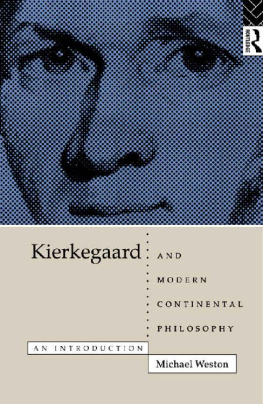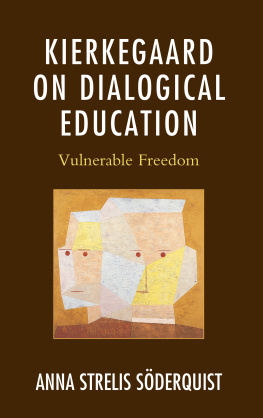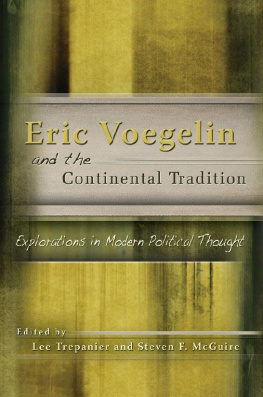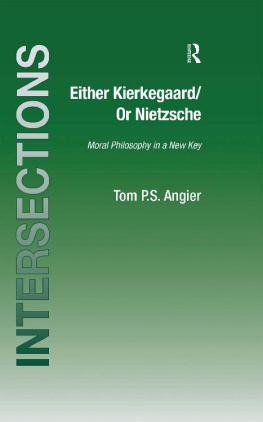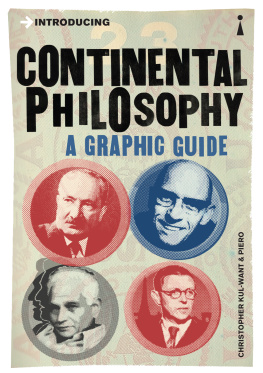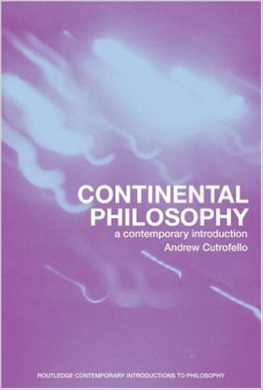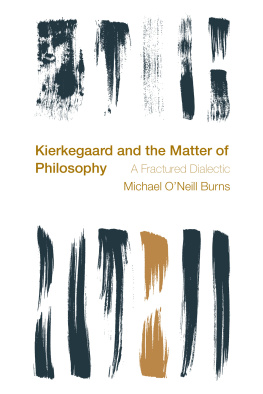Michael Weston - Kierkegaard and Modern Continental Philosophy
Here you can read online Michael Weston - Kierkegaard and Modern Continental Philosophy full text of the book (entire story) in english for free. Download pdf and epub, get meaning, cover and reviews about this ebook. year: 2003, publisher: Taylor and Francis, genre: Science. Description of the work, (preface) as well as reviews are available. Best literature library LitArk.com created for fans of good reading and offers a wide selection of genres:
Romance novel
Science fiction
Adventure
Detective
Science
History
Home and family
Prose
Art
Politics
Computer
Non-fiction
Religion
Business
Children
Humor
Choose a favorite category and find really read worthwhile books. Enjoy immersion in the world of imagination, feel the emotions of the characters or learn something new for yourself, make an fascinating discovery.
- Book:Kierkegaard and Modern Continental Philosophy
- Author:
- Publisher:Taylor and Francis
- Genre:
- Year:2003
- Rating:3 / 5
- Favourites:Add to favourites
- Your mark:
- 60
- 1
- 2
- 3
- 4
- 5
Kierkegaard and Modern Continental Philosophy: summary, description and annotation
We offer to read an annotation, description, summary or preface (depends on what the author of the book "Kierkegaard and Modern Continental Philosophy" wrote himself). If you haven't found the necessary information about the book — write in the comments, we will try to find it.
Kierkegaard and Modern Continental Philosophy — read online for free the complete book (whole text) full work
Below is the text of the book, divided by pages. System saving the place of the last page read, allows you to conveniently read the book "Kierkegaard and Modern Continental Philosophy" online for free, without having to search again every time where you left off. Put a bookmark, and you can go to the page where you finished reading at any time.
Font size:
Interval:
Bookmark:
Kierkegaard and Modern Continental Philosophy
This bold attempt to secure for Kierkegaard the same kind of role in contemporary continental philosophy already enjoyed by Nietzsche is a challenge both to those who leave him out of current conversations altogether and to those who treat him as if he were just another French poststructuralist.
It is lucidly written and remarkably free of jargon. Westons expositions of the major figures he discusses will be accessible to undergraduates, while his argument will require specialist scholars to take note. Both as a teacher and as a scholar I want to keep this book ready-to-hand.
Merold Westphal, Fordham University
In Kierkegaard and Modern Continental Philosophy: An Introduction Michael Weston argues that, despite being acknowledged as a precursor to Nietzsche and post-Nietzschean thinkers such as Heidegger and Derrida, the radical nature of Kierkegaards critique of philosophy has been missed.
Michael Weston examines and explains the metaphysical tradition, as exemplified by Plato and Hegel, and the postmetaphysical critiques of Nietzsche, Heidegger and Derrida. He shows how Kierkegaards ethical critique of philosophy undermines the former and escapes the latter. He considers another ethical critique of philosophy, that of Levinas, before identifying ethics as the non-philosophical site from which philosophy can be criticized. Kierkegaard and Modern Continental Philosophy: An Introduction argues that by refusing to allow philosophy jurisdiction over ethics and religion, Kierkegaards critique applies as much to modern continental thought as to the metaphysical thought it seeks to undermine.
Michael Weston lectures in philosophy at the University of Essex. His previous book was Morality and the Self (1975).
Kierkegaard and Modern Continental Philosophy
An Introduction
Michael Weston

First published 1994
by Routledge
Published 2014 by Routledge
2 Park Square, Milton Park, Abingdon, Oxon OX14 4RN
Simultaneously published in the USA and Canada
by Routledge
711 Third Avenue, New York, NY, 10017, USA
Routledge is an imprint of the Taylor & Francis Group, an informa business
1994 Michael Weston
All rights reserved. No part of this book may be reprinted or reproduced or utilized in any form or by any electronic, mechanical, or other means, now known or hereafter invented, including photocopying and recording, or in any information storage or retrieval system, without permission in writing from the publishers.
British Library Cataloguing in Publication Data
A catalogue record for this book is available from the British Library.
Library of Congress Cataloging-in-Publication Data
Weston, Michael, 1946
Kierkegaard and modern continental philosophy: an introduction/Michael Weston.
p. cm.
Includes bibliographical references and index.
1. Kierkegaard, Sren, 18131855Influence. 2. Philosophers, ModernEurope. 3. Philosophy, EuropeanHistory. I. Title.
B4377.W461993
198.9dc20
9321649
CIP
ISBN 13: 978-0-415-10120-2 (pbk)
For Margaret, William and James.
For my Mother and to the memory of my late Father.
And they said, Go to, let us build a city and a tower, whose top may reach unto heaven; and let us make us a nameAnd the Lord came down to see the city and the tower, which the children of men builded. And the Lord said, Behold, the people is one, and they have all one language; and this they begin to do: and now nothing will be restrained from them, which they have imagined to do. Go to, let us go down, and there confound their language, that they may not understand one anothers speech.
Genesis 11: 48
The fact of the matter is that we must acknowledge that in the last resort there is no theory.
S.Kierkegaard, Journals and Papers, entry 2509
Contents
Kierkegaard had a premonition of the fate of his writings:
Alas, but I know who is going to inherit from me, that character I find so repulsive, he who will keep on inheriting all that is best just as he has done in the pastnamely, the assistant professor, the professor.
(Journals 6818)
He was right about this. After it became available in major European languages at the beginning of this century, his work helped to form and was absorbed into some of the new tendencies in philosophy then developing, existential phenomenology and existentialism. (I look at some of the structural parallels with Heideggers earlier work in ). For, as he remarked, Existenceis a difficult category to deal with; for if I think it, I abrogate it, and then I do not think it (Ibid., p. 274). I hope too that the accounts given of the philosophical thinkers I deal with may prove useful in themselves, for Kierkegaard would have stressed that liberation from the temptations of philosophy requires experiencing its power of seduction and so a treating of it with seriousness.
Where the person is understood within metaphysical conceptuality which emphasizes autonomy, or post-metaphysical thought which involves an historical self-situating determining the present task of an intervention into metaphysically formed structures of thought and life, I have used the third person masculine form. Where the person is understood religiously, or positioned within Kierkegaards existential dialectic, and so in terms of the notions of giving and grace, and thus of the primacy of love, I have used the feminine.
I am indebted to discussions with Michael McGhee of the University of Liverpool over the years since we were students together, to Professor Peter Winch who first encouraged my reading of Kierkegaard and Simone Weil, to Professors Robert Bernasconi and David Krell who incited an interest in Heidegger and Derrida, and to Simon Critchley of the University of Essex for his expertise in modern French thought. The Department at Essex has provided a varied and stimulating working environment, whilst the Universitys provision of sabbatical leave enables its teachers to develop their research interests. I am grateful too to all my students over the years who have helped, in their interest and opposition, the formation of my understanding of Kierkegaard. Linda Day typed the manuscript and good-humouredly put up with my constant alterations and revisions. Adrian Driscoll of Routledge has been a supportive and encouraging editor. My thanks finally to the most important, if indirect, contributors to this book, Margaret and our children William and James.
Consider the following estimations by philosophers of the significance of their work:
Unlesseither philosophers become kings in our states or those whom we now call our kings and rulers take to the pursuit of philosophy seriously and adequatelythere can be no cessation of troubles, dear Glaucon, for our states, nor, I fancy, for the human race either.
All that proceeds from thoughtall the distinctions of the arts and sciences and of the endless interweavings of human relationships, habits and customs, activities, skills and enjoymentsfind their ultimate center in the one thought of God philosophy is theology, and [ones] occupation with philosophyor rather in philosophyis of itself the service of Godwe should know God cognitivelyand should esteem this cognition above all elsethese lectures havethe purpose of knowing God.
no one before me has known the right path, the ascending path: only after me are there again hopes, tasks, prescribable paths of culturePrecisely therewith am I a destiny.
man essentially occurs only in his essence where he is claimed by BeingThinking lets itself be claimed by Being so that it can say the truth of Being.
Next pageFont size:
Interval:
Bookmark:
Similar books «Kierkegaard and Modern Continental Philosophy»
Look at similar books to Kierkegaard and Modern Continental Philosophy. We have selected literature similar in name and meaning in the hope of providing readers with more options to find new, interesting, not yet read works.
Discussion, reviews of the book Kierkegaard and Modern Continental Philosophy and just readers' own opinions. Leave your comments, write what you think about the work, its meaning or the main characters. Specify what exactly you liked and what you didn't like, and why you think so.

